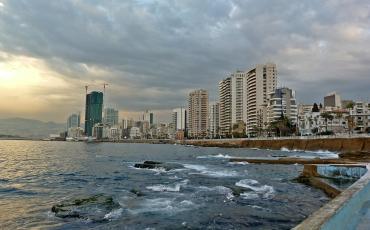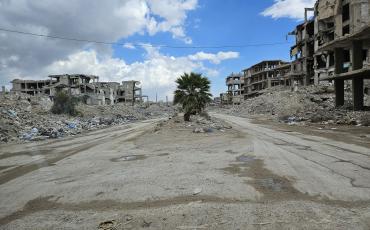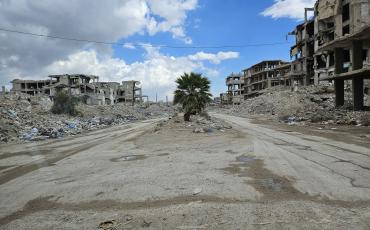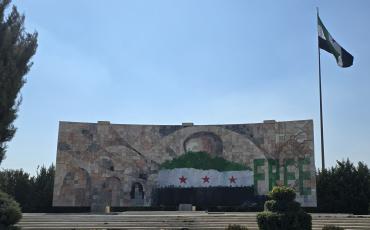While the international community is focusing on possible negotiations for Syria in Geneva, the self-proclaimed ‘Islamic State’ keeps tightening its brutal grip on civilians. Syrian journalists have now documented the IS’s abusive prison system. By Mohammad Hassan
The Syrian journalist Mohammad Hassan is a member of the Syrian press collective Sound and Picture. Hassan was forced to leave his hometown Deir Ezzor only months ago, after having reported undercover from inside the IS-held territories. Alsharq has not been able to cross-check the information given in this report. Nonetheless we have decided to publish it as the account of what happens in areas practically inaccessible for independent media – Syrian or foreign – and as the courageous work of a fellow journalist.
It has been a month since Amer was released from an IS prison. Amer was known in Deir Ezzor as “the hero of the Revolution” in both nonviolent and military form, and despite that he didn’t participate in the fight against IS in Deir Ezzor, he was one of the first arrested by IS a year ago. When we met Amer, he looked pale and skinny, the scars of torture covered his body: dark blue spots all over his skin. We knew later that these were caused by electrocution.
“Physical suffering will end, but the insult is the thing that I will never forget”, Amer said during an interview. After a moment of crying he continued: “The security men of IS are as horrible as the security men of Bashar al-Assad. Torture, humiliation... all practices are similar in form and content. IS depends mainly on this to maintain its unity and eliminate any threat, especially from the inside.”
Security men did exist before IS
Security work is not something new in the region, it began even before the split of Al-Nusra Front and the Islamic state in Iraq (ISI) in mid-2013, which resulted in the emergence of the Islamic State in Iraq and Sham (ISIS) and later the Islamic state (IS). Before the Declaration of the Caliphate, the security work was not organized in terms of performance and lacked a central rule.
Zaid Althabet, a field activist from Deir Ezzor, explained: “Before the start of the battles between IS and the armed factions, which had been present in the province, the security work of IS was limited to some civilians called ‘The Loyals’. They were planted around the province, especially among the armed factions. Their role was limited to information gathering, and this has contributed largely in the opposition factions’ loss”. Those “Loyals” took orders from IS warlords in each area.
Althabet added: “The security work for IS started to recruit leaders in the Free Syrian Army (FSA), such as Abu Hamza Sbehan, the leader of the Islamic Army, who transferred information about the army's moves and plans in fighting IS. Before he was exposed he used to convey the information through frequent visits to Raqqa and Shaddadi, a city in the countryside of Hasaka, to meet IS leaders.”
Althabet also pointed out that before the control of Deir Ezzor IS security men had a big role in assassinations and the planting of explosive devices. Many military leaders of the FSA were affected, such as Riad Al-Asa'ad, who was assassinated on 15 March 2013.
After the control of large areas of Deir Ezzor, Raqqa, Homs, Hasaka and East Aleppo, IS began to give the security men greater power to maintain its unity and to ensure the absence of any actions that may threaten its existence. Thus, major developments have occurred on the structural and functional level: Security men became the most important administrative organ of IS and have been given full support and unlimited power.
Confidentiality and ultimate power without control
The security work of IS is extremely secretive and the majority of its components are working with absolute confidentiality.
Taim Ramadan, a human rights activist involved in the Raqqa is being slaughtered silently campaign, said: “IS security members are unknown both to the public and to regular IS members. They are mostly immigrants or locals who are known for their absolute loyalty to IS. If any of them were identified by people, the one would be dismissed or withdrawn from the security to any other section. According to IS, confidentiality is the key to collect the largest amount of information.”
Ramadan also said: “The security work of IS is not only restricted to prosecute civilians but also to hold IS members accountable in case they violated orders. The establishment of this security system created a situation of mistrust among IS members. The security men have an absolute and limitless power as in the administrative hierarchy of IS there is no judicial or legislative power that has the right to question them. They can arrest and kill anyone, even IS members and higher ranks, without having to refer to the leadership.”
Saber, a former security man in Raqqa countryside who refused to reveal his real name for the fear of IS, said: “Security men hold absolute powers such as arresting, killing or torturing detainees to get information and extract confessions. They even arrest innocent people and kill them just because of suspicion - and despite those mistakes there is no possibility to punish them.”
He told us: “Before my desertion from IS, a young man from Kharita town was brought to Ma'dan city security headquarter on charges of burning a vehicle belonging to IS. They questioned and tortured him in the ugliest ways in order to force him to make a confession. A few days later, IS took the man to a square in the town center and executed him by cutting off his head in front of his family and relatives. After a month, the man who really burned the car was identified but he was already outside IS areas. However, the executers were not punished, instead IS paid blood money to the innocent man's family. Such incidents happen continuously in all areas controlled by IS.”
Testimonies of released prisoners
Security prisons are separated from the rest of IS prisons. Security prisoners are held in a security prison first and then, if found guilty, referred to another prison or transferred to the death square, or, if found innocent, released.
Essam, 33 years old from the eastern countryside of Deir Ezzor, spent six months in the security prison in Almayadeen city. He said: “I was arrested under charges of fighting IS and stayed in detention for six months. I was subjected to four hours of questioning every day for a month and a half. They practiced all kinds of torture on me: flogging, electrocution, not to mention beating with weapons and burning. Psychological torture is also one of their torture methods.”
Essam was forced to watch execution videos of hostages and was then taken to a place in the desert where a gun was put to his head or a knife to his throat and he was told that if he did not confess on the charges of possessing a weapon and fighting against IS he would be killed.
“I was very scared in that place, but there was nothing to confess”, Essam said. “Later I found out that all of it was a play to pull out confessions! Many of those who were subjected to this kind of torture have confessed things they never did out of fear. The same happened with a child who was arrested on charges of planning to assassinate some IS members. The boy said all they wanted to hear - even though he was innocent. Torture and psychological terror forced a lot of innocent people to confess or even to choose death just to get rid of this nightmare in security prisons.”
Mustafa Al-Faleh, from Ma'dan city in the eastern countryside of Raqqa, was - before the outbreak of the Syrian revolution - known for his opposition to the regime and respectively arrested many times. Later, Al-Faleh was arrested by IS in Tal Abiad city in Raqqa after his return from a aconference held in Istanbul. Faleh was not subjected to as much harassment as others, for IS wanted to win him over to their side and pledge his allegiance.
Al Faleh told us: “I moved between several prisons: from Tel Abiad to Muhafaza building, then to the Pioneers camp and finally to Akrishi prison. All jailers were foreigners, none of them Syrian, the majority from Tunisia and Saudi Arabia.”
Months have passed and al-Faleh still remembers the smallest details, even the words he heard there. He remembers one jailer calling upon the prisoners: “Turn your faces to the wall!” and another Iraqi jailer saying: “The innocent of you are going to be released but the guilty are going to be chopped and reproached to the dogs.” This was just like what he used to hear in the regime’s prisons.
Der Blog Alsharq ist ein Projekt von Ehrenamtlichen. Wenn Du unabhängigen Journalismus zum Nahen Osten nachhaltig fördern willst, werde hier Fördermitglied von Alsharq e.V.






















